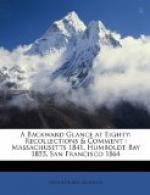He died honored everywhere as America’s greatest philosopher, one of the world’s foremost thinkers, and withal a very lovable man.
CHARLES GORDON AMES
In the early days Rev. Charles Gordon Ames preached for a time in Santa Cruz. Later he removed to San Jose, and occasionally addressed San Francisco audiences. He was original and witty and was in demand for special occasions. In an address at a commencement day at Berkeley, I heard him express his wonder at being called upon, since he had matriculated at a wood-pile and graduated in a printing-office. Several years after he had returned East I was walking with him in Boston. We met one of his friends, who said, “How are you, Ames?” “Why, I’m still at large, and have lucid intervals,” replied the witty preacher. He once told me of an early experience in candidating. He was asked to preach in Worcester, where there was a vacancy. Next day he met a friend who told him the results, saying: “You seem to have been fortunate in satisfying both the radicals and the conservatives. But your language was something of a surprise; it does not follow the usual Harvard type, and does not seem ministerial. You used unaccustomed illustrations. You spoke of something being as slow as molasses. Now, so far as I know, molasses is not a scriptural word. Honey is mentioned in the Bible, but not molasses.”
JOAQUIN MILLER
The passing of Joaquin Miller removed from California her most picturesque figure. In his three-score and twelve years he found wide experience, and while his garb and habits were somewhat theatrical he was a strong character and a poet of power. In some respects he was more like Walt Whitman than any other American poet, and in vigor and grasp was perhaps his equal. Of California authors he is the last of the acknowledged leading three, Harte and Clemens completing the group. For many years he lived with his wife and daughter at “The Heights,” in the foothills back of Oakland, writing infrequently, but with power and insight. His “Columbus” will probably be conceded to be his finest poem, and one of the most perfect in the language. He held his faculties till the last, writing a few days before his death a tender message of faith in the eternal.
With strong unconventionality and a somewhat abrupt manner, he was genial and kindly in his feelings, with warm affections and great companionability.
An amusing incident of many years ago comes back to freshen his memory. An entertainment of a social character was given at the Oakland Unitarian church, and when my turn came for a brief paper on wit and humor I found that Joaquin Miller sat near me on the platform. As an illustration of parody, bordering on burlesque, I introduced a Miller imitation—the story of a frontiersman on an Arizona desert accompanied by a native woman of “bare, brown beauty,” and overtaken by heat so intense that but one could live, whereupon, to preserve the superior race, he seized a huge rock and




